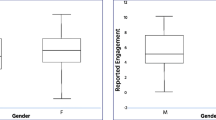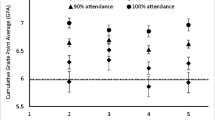Abstract
Problem-based learning (PBL) has been used to scaffold and support student learning in many Australian medical programs, with the role of the facilitator in the process considered crucial to the overall educational experience of students. With the increasing size of student cohorts and in an environment of financial constraint, it is important to develop quality control procedures to maintain an effective and efficient PBL program and a stable tutor workforce. This paper reports on organisational practices and faculty development opportunities used to sustain facilitation quality in a large cohort PBL program. Seven strategies are proposed, built around a sound professional development program, and a suite of tactics for recruitment of, and ongoing support for, PBL tutors.
Similar content being viewed by others
References
AAMC. (2008). Medical school enrolment plans: Analysis of the 2007 AAMC Survey. Washington, DC: Association of American Medical Colleges.
Albanese, M. (2000). Problem-based learning: Why curricula are likely to show little effect on knowledge and clinical skills. Medical Education, 34, 729–738.
Albanese, M., & Mitchell, S. (1993). Problem-based learning: A review of literature on its outcomes and implementation issues. Academic Medicine, 68, 52–81.
Barrows, H. S. (1988). The tutorial process. Springfield, IL: Southern Illinois University School of Medicine.
Barrows, H. S., & Tamblyn, R. (1980). Problem-based learning. New York: Springer.
Bligh, J. (2004). More medical students, more stress in the medical education system. Medical Education, 38, 460–462.
Boulos, M. N., Maramba, I., & Wheeler, S. (2006). Wikis, blogs and podcasts: A new generation of web based tools for virtual clinical practice and education. BMC Medical Education, 15, 41.
Brooks, P. M., Lapsley, H. M., & Butt, D. B. (2003). Medical workforce issues in Australia: “Tomorrow’s doctors—Too few, too far”. Medical Journal of Australia, 179, 206–208.
Corrigan, M. A., Shields, C. J., & Redmond, H. P. (2007). Factors influencing surgical career choices and advancement in Ireland and Britain. World Journal of Surgery, 31, 1921–1929.
De Grave, W. S., Dolmans, D., & Van Der Vleuten, C. P. (2002). Student perspectives on critical incidents in the tutorial group. Advances in Health Sciences Education, 7, 201–209.
Dolmans, D., Gijselaers, W. H., Moust, J. H. C., De Grave, Wolfhagen, I., & Van Der Vleuten, C. (2002). Trends in research on the tutor in problem based learning: Conclusions and implications for educational practice and research. Medical Teacher, 24, 173–180.
Farrow, R., & Norman, G. (2003). The effectiveness of PBL: The debate continues. Is meta-analysis helpful? Medical Education, 37, 1131–1133.
Fox, G., & Arnold, S. (2008). The rising tide of medical graduates: How will postgraduate training be affected? Medical Journal of Australia, 189, 515–518.
Guerrero, A. (2001). Mechanistic case-diagramming: A tool for problem-based learning. Academic Medicine, 76, 385–389.
Hmelo-Silver, C. E., & Barrows, H. (2006). Goals and strategies of a problem-based learning facilitator. Interdisciplinary Journal of Problem-based Learning, 1, 21–39.
Hogan, D., & Kwiatkowski, R. (1998). The emotional aspects of large group teaching. Human Relations, 51(11), 1403–1417.
Hung, W. (2011). Theory to reality: A few issues in implementing problem-based learning. Educational Technology Research and Development, 59, 529–552.
Joyner, B., & Young, L. (2006). Teaching medical students using role play: 12 tips for successful role play. Medical Teacher, 28, 225–229.
Khoo, H. E. (2003). Implementation of problem-based learning in Asian medical schools and students’ perceptions of their experience. Medical Education, 38, 401–409.
Kirkpatrick, D. L. (1994). Evaluating training programs: The four levels. San Francisco, CA: Berrett-Koehler Publishers.
Loftus, S., & Higgs, J. (2005). Reconceptualising problem based learning in a Vygotskian framework. Focus on Health Professional Education: A Multi-Disciplinary Journal, 7, 1–14.
Maudsley, G. (1999). Roles and responsibilities of the problem-based learning tutor in the undergraduate medical curriculum. British Medical Journal, 318, 657–661.
Mayo, W. P., Donnelly, M. B., & Schwartz, R. W. (1995). Characteristics of the ideal problem-based learning tutor in clinical medicine. Evaluation and the Health Professions, 18, 124–136.
McInerney, D. M., & McInerney, V. (1998). Educational psychology: Constructing learning. Sydney: Prentice Hall.
McLean, M. (2004). Sustaining problem-based learning reform: Advice in hindsight! Medical Teacher, 26(8), 726–728.
McLean, M., & Van Wyk, J. (2006). Twelve tips for recruiting and retaining facilitators in a problem-based learning programme. Medical Teacher, 28, 675–679.
Merrienboer, J., & Sweller, J. (2010). Cognitive load theory in health professional education: Design principles and strategies. Medical Education, 44, 85–93.
Moust, J. H. C., Van Berkel, H. J. M., & Schmidt, H. G. (2005). Signs of erosion: Reflections on three decades of problem-based learning at Maastricht University. Higher Education, 50, 665–683.
Ozan, S., Karademir, S., Gursel, Y., Taskiran, H. C., & Musal, B. (2005). First graduates’ perceptions on a problem based and task based learning curriculum. Education Health (Abington), 18, 256–271.
Papinczak, T. (in press a). Facilitation tactics and approaches: Taking valid measures of student perceptions of their tutors. Focus on Health Professional Education: A Multi-Disciplinary Journal.
Papinczak, T. (in press b). Perceptions of job satisfaction relating to affective organisation commitment. Medical Education.
Papinczak, T., Peterson, R., Babri, A., Ward, K., Kippers, V., & Wilkinson, D. (2012). Using student-generated questions for student-centred assessment. Assessment & Evaluation in Higher Education, 37(4), 439–452.
Papinczak, T., Tunny, T., & Young, L. (2009). “Conducting the symphony”: A qualitative study of facilitation in problem-based learning tutorials. Medical Education, 43, 377–383.
Read, B., Archer, L., & Leathwood, C. (2003). Challenging cultures? Student conceptions of ‘belonging and isolation’ at a post-1992 university. Studies in Higher Education, 28(3), 261–277.
Segouin, C., Jouquan, J., Hodges, B., Pierre-Henri Bréchat, P. H., David, S., Maillard, D., et al. (2007). Country report: Medical education in France. Medical Education, 41, 295–301.
Steinert, Y. (2004). Student perceptions of effective small group teaching. Medical Education, 38, 286–293.
Steinert, Y., & Mann, K. V. (2006). Faculty development: Principles and practice. Journal of Veterinary Medical Education, 33(3), 317–323.
Stoddart, G. L., & Barer, M. L. (1999). Will increasing medical school enrolment solve Canada’s physician supply problem. Canadian Medical Association Journal, 161, 983–984.
Taylor, D., & Miflin, B. (2008). Problem-based learning: Where are we now? Medical Teacher, 30, 742–763.
Tiwari, A., Lai, P., So, M., & Yuen, K. (2006). A comparison of the effects of problem-based learning and lecturing on the development of students’ critical thinking. Medical Education, 40, 547–554.
Tunny, T. (2007). Curriculum delivery in a PBL based medical program. Focus on Health Professional Education, 9, 1–5.
Van Berkel, H. J. M., & Dolmans, D. (2006). The influence of tutoring competencies on problems, group functioning and student achievement in problem-based learning. Medical Education, 40, 730–736.
Walters, M. R. (2001). Problem-based learning with physiology lectures. Advances in Physiology Education, 25, 225–227.
White, N. R. (2006). Tertiary education in the naughties: The student perspective. Higher Education Research & Development, 25, 231–246.
Willis, S. C., Jones, C., Bundy, K., Burdett, C. R., Whitehouse, C., & O’Neill, P. A. (2002). Small group work and assessment in a PBL curriculum: A qualitative and quantitative evaluation of student perceptions of the process of working in small groups and its assessment. Medical Teacher, 24, 495–501.
Winefield, A. H., Gillespie, N., Stough, C., Dua, J., Hapuarachchi, J., & Boyd, C. (2003). Occupational stress in Australian university staff: Results from a national survey. International Journal of Stress Management, 10, 51–63.
Wood, D. F. (2003). ABC of learning and teaching in medicine. British Medical Journal, 326(7384), 328–330.
Author information
Authors and Affiliations
Corresponding author
Rights and permissions
About this article
Cite this article
Young, L., Papinczak, T. Strategies for sustaining quality in PBL facilitation for large student cohorts. Adv in Health Sci Educ 18, 825–833 (2013). https://doi.org/10.1007/s10459-012-9387-7
Received:
Accepted:
Published:
Issue Date:
DOI: https://doi.org/10.1007/s10459-012-9387-7




